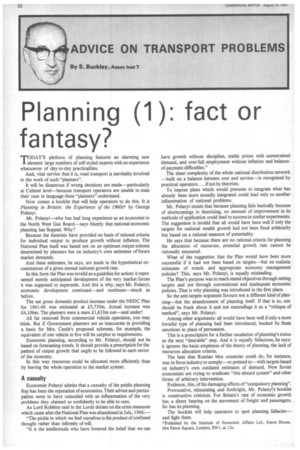Planning (1): fact or fantasy?
Page 54

If you've noticed an error in this article please click here to report it so we can fix it.
DAY'S plethora of planning features an alarming new relement: large numbers of self-styled experts with no experience whatsoever of day-to-day practicalities.
And, vital service that it is, road transport is inevitably involved in the work of such "planners".
It will be disastrous if wrong decisions are made—particularly at Cabinet level—because transport operators are unable to state their case in language these "planners" understand.
Now comes a booklet that will help operators to do this. It is Planning in Britain: the Experience of the 1960s* by George Polanyi.
Mr. Polanyi—who has had long experience as an economist to the North West Gas Board—says bluntly that national economic planning has flopped. Why?
Because the theorists have provided no basis of rational criteria for individual output to produce growth without inflation. The National Plan itself was based not on an optimum output scheme determined by planners but on industry's own estimates of future market demands.
And these estimates, he says, are made in the hypothetical circumstances of a given annual national growth rate.
In this form the Plan was invalid as a guideline for action: it represented merely anticipated development of the very market forces it was supposed to supersede. And this is why, says Mr. Polanyi, economic development continued—and continues—much as before.
The net gross domestic product increase under the NEDC Plan for 1961-66 was estimated at £5,739m. Actual increase was £4,106m. The planners were a mere £1,633m out—and under!
All far removed from commercial vehicle operation, you may think. But if Government planners are as inaccurate in providing a basis for Mrs. Castle's proposed schemes, for example, the equivalent of one vehicle in five will be surplus to requirements.
Economic planning, according to Mr. Polanyi, should not be based on forecasting trends. It should provide a prescription for the pattern of output growth that ought to be followed in each sector of the economy.
In this way resources could be allocated more efficiently than by leaving the whole operation to the market system.
A casualty
Economist Polanyi admits that a casualty of the public planning flop has been the reputation of economists. Their advice and participation seem to have coincided with an inflammation of the very problems they claimed so confidently to be able to cure.
As Lord Robbins said in the Lords debate on the crisis measures which came after the National Plan was abandoned in July, 1966:—
"The pickle in which we find ourselves is the product of confused thought rather than infirmity of will.
"It is the intellectuals who have fostered the belief that we can
have growth without discipline, stable prices with unrestrained demand, and over-full employment without inflation and balanceof-payment difficulties.
The sheer complexity of the whole national distribution network built on a balance between cost and service—is recognized by practical operators . .. if not by theorists.
To impose plans which would presume to integrate what has already been more soundly integrated could lead only to another inflammation of national problems.
Mr. Polanyi insists that because planning fails basically because of shortcomings in theorizing, no amount of improvement in its methods of application could lead to success in similar experiments. The suggestion is invalid that all would have been well if only the targets for national wealth growth had not been fixed arbitrarily but based on a rational measure of potentiality.
He says that because there are no rational criteria for planning the allocation of resources, potential growth rate cannot be rationally measured.
What of the suggestion that the Plan would have been more successful if it had not been based on targets—but on realistic estimates of trends and appropriate economy management policies? This, says Mr. Polanyi, is equally misleading.
The Plan's purpose was to reach stated objectives through setting targets and not through conventional and inadequate economic policies. That is why planning was introduced in the first place.
So the anti-targets argument favours not a different kind of planning—but the abandonment of planning itself. If that is so, one should be frank about it and not camouflage it as a "critique of method", says Mr. Polanyi.
Among other arguments: all would have been well if only a more forceful type of planning had been introduced, backed by State sanctions in place of persuasion.
This is a prescription for a further escalation of planning's status as the next "desirable" step. And it is equally fallacious, he says: it ignores the basic emptiness of the theory of planning, the lack of resources allocation criteria.
The best that Russian bloc countries could do, for instance, was to force industry to comply—or pretend to—with targets based on industry's own outdated estimates of demand. Now Soviet economists are trying to eradicate "this absurd system" and other forms of arbitrary intervention.
Evidence, this, of the damaging effects of "compulsory planning".
Provocative, stimulating and forthright, Mr. Polanyi's booklet is constructive criticism. For Britain's rate of economic growth has a direct bearing on the movement of freight and passengers. So has its planning.
The booklet will help operators to spot planning fallacies— and fight them.
*Published by the Institute of Economic Affairs Ltd., Eaton House, 66a Eaton Square, London, SW1, at 12s.












































































































